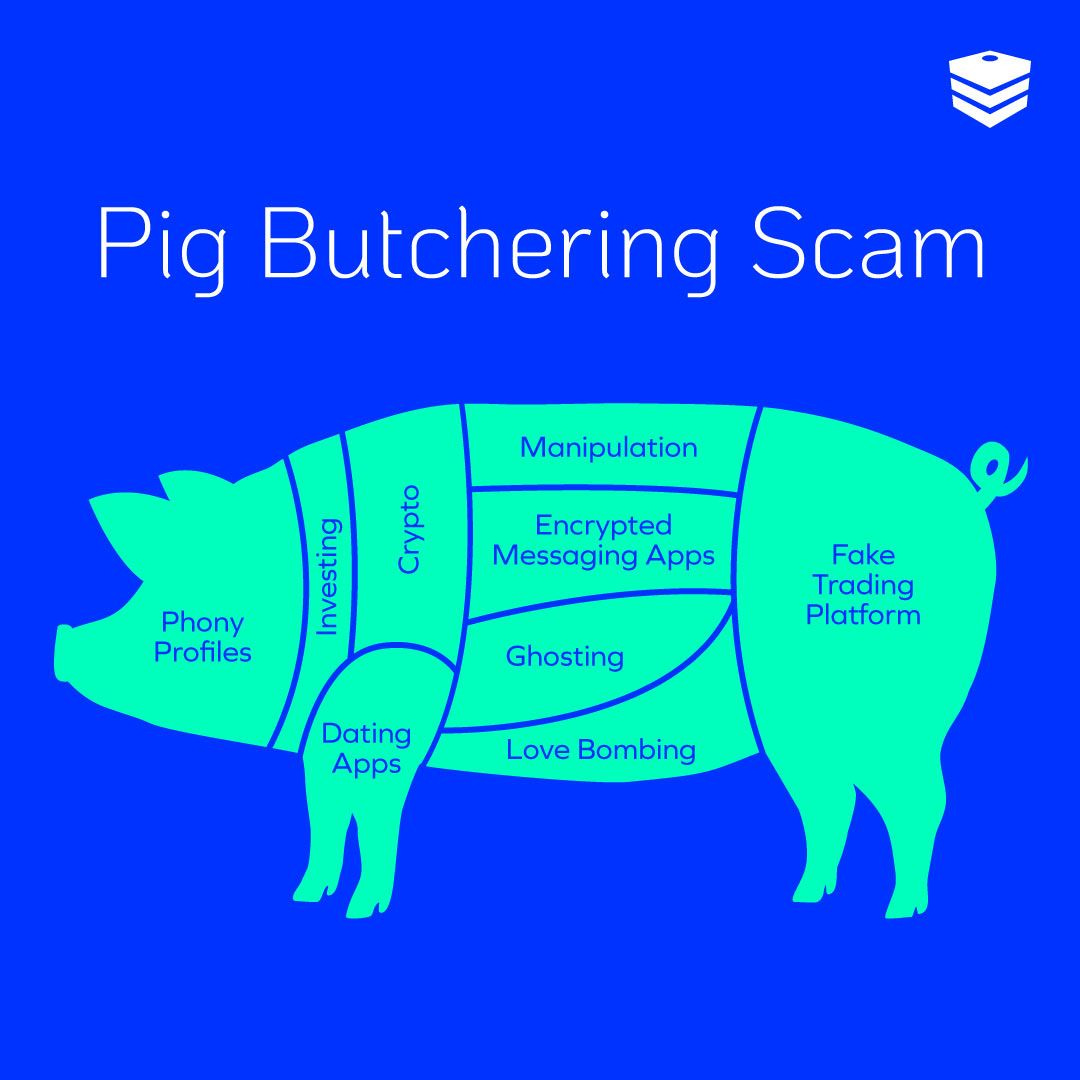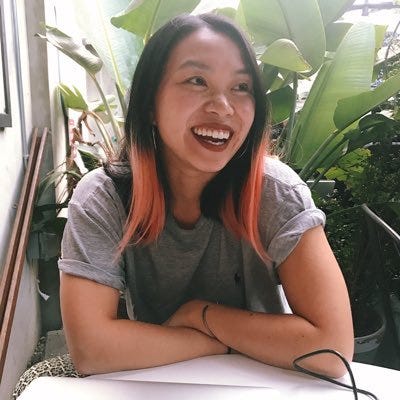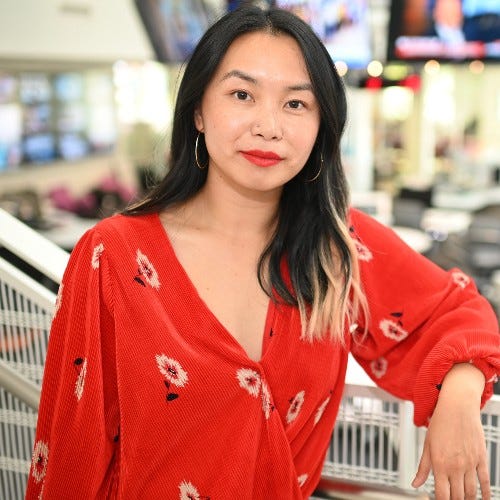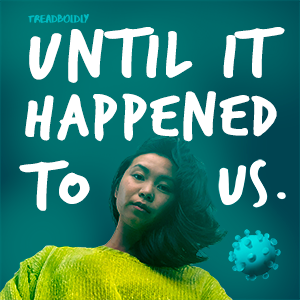Asian A.V. Club newsletter #43: Denise Chan
Meet our first ever podcast producer chat in the form of the award winning journalist Denise Chan, as she brings to us the exciting 6-part podcast Scam Factory, where every text lies a trap!
Throughout her career, award-winning investigative journalist Denise Chan has told compelling stories across multiple mediums. First in news, then as a celebrated documentary filmmaker and now a chart-topping podcast producer. With Scam Factory, Chan takes center stage with this six-part investigative podcast thriller, ready to be your next obsession.
Telling the true story of Max, a young Filipino worker, who’s promise of a lucrative job abroad quickly turns into a nightmare, as he is tricked into a modern slavery at a scam compound. But the true heart of this piece is the tenacity and determination of his sister Charlie, who manages to find a way to bring him home. Narrated by Chan herself, Scam Factory has a real life plot that is more dynamic than Hollywood fiction, which is why we were very keen to find out more about Denise and also how she uncovered this exhilarating story.
Asian A.V. Club: I’m looking at your setup and I’m admiring how professional it all looks. I’m literally thinking, now there’s a great podcast producer, your voice is going to sound perfect!
Denise Chan: (laughs) I just did an interview for a different story and I was just walking the source to put the mic six inches away from them. I just kept the setup for you, so I could give you the best quality.
Asian A.V. Club: Thank you, but I’m just recording the audio on my phone… so yeah, you’re winning! (laughs) I also have to say you are officially our first ever podcast producer representing a podcast on the Asian A.V. Club, so congrats!!
Denise Chan: I feel honored to be your first foray into podcast. Hopefully you will feature a lot of podcast producers after this.
Asian A.V. Club: Oh definitely! I was really curious about your true crime podcast Scam Factory, because I feel like since the pandemic, phone scams have been so prevalent with everyone globally. And once you look behind the curtain, you realize that it’s made up of a really complex web of organizations that have made billions of dollars from unsuspecting victims. What was your entry point to this world? Did you have any personal connection to these scams?
Denise Chan: Like everybody else who gets all these scam texts, and I kept getting them all throughout the pandemic. And I was just kind of curious, like, what was going on behind these texts? But when I found out that thousands of people behind these texts are trapped in these compounds and forced to scam people 12-14 hours a day, I was stunned. And so I wanted to talk to somebody who had escaped from these compounds. Reporting on this story took about two years, just trying to get that access.
When we hear about scam stories, oftentimes we hear about the people who are the victims, which is a very serious thing that happens to people. But hearing the other side that some of the scammers are also victims, felt like a different angle that a lot of listeners would be really intrigued to hear about.
Asian A.V. Club: There have been so many stories of people in Asia getting lucrative job opportunities in Thailand only to find themselves taken against their will to laundering compounds. Even more recently an actor in China thought he had an acting job in Thailand, but was trafficked and had to be rescued by the Thai police once his story was made public. People in Asia are cancelling trips to Thailand because of these stories.
Denise Chan: Yeah, my dad lives in Macau, and he’s saying that everybody in Asia has been reporting on this story for a while now. And it's interesting, recently, Hong Kong pop star Eason Chan even cancelled his concert in Bangkok over concerns for Chinese citizens travelling to the country. That level of paranoia is crazy. So it’s timely that Scam Factory is coming out at this moment in time when there’s this renewed pressure on China and Thailand to do something about these compounds.
But when I talk to friends, a lot of them had no idea about these pig butchering scams. They had no idea what was happening on the other side of the world. And so I was particularly interested in telling this story, because there's an opportunity to bring what's happening over there to here, because I think it's not only an important story, but also an opportunity to show how interconnected we all are. I think when you hear “human trafficking” over on the other side of the world, you don't really think about how it impacts you, but it has everything to do with us, right? Because if they're suffering over there, it comes straight to our phones, and they're gonna text us right away and try to scam us of our money.
Asian A.V. Club: How did you find your subjects?
Denise Chan: It was kind of unexpected, really. We had heard of two individuals who had just escaped or been rescued from the compound maybe two or three days prior. Colonel Matalang, who’s in this story, told us there were two sources willing to talk about their experience. So we thought, Okay, let’s go talk to them. As we sat down in the café to speak with them—these two individuals, who turned out to be Max and Jane in the series—we noticed a woman sitting to the side. Max kept looking over at her while answering questions. When we turned the recording off, we learned that was Charlie, Max’s older sister. Only after that did we realize not only was she his sister and had helped get him out, but she had played an even bigger role.
It was like pulling on a thread. The more we talked to Charlie, the more we saw there was a story here—a compelling, relatable one about these siblings. At its heart, this podcast is a story about family: a sister who learns her brother Max is in danger and goes to extreme lengths to rescue him. From there, we realized how powerful this was. The series raises questions like: How far would you go to protect someone you love? Would you harm people you don’t know to save yourself or those you love?
Asian A.V. Club: As someone who has never done investigative journalism, I’m always curious about how deep do you have to go with your research. Were there trips to the border of Myanmar or tailing the police during a bust? How far do you need to go to tell the story correctly?
Denise Chan: That's a good question. For our limited series team, every story we publish meets a high standard for accuracy—we ensure everything is true and fact-based. This story was particularly challenging because people leaving these compounds can't document their experiences freely. Their phones are heavily monitored; they can't take photos or communicate openly. Often, their devices are wiped upon exit, making hard evidence scarce.
On the reporting side, we did extensive verification to confirm events actually happened. We worked with on-the-ground reporters, like video journalist Vijitra Duangdee in Thailand and Janvic Mateo in Manila, to get the facts right.
On top of that, Some claims about the compounds sounded unbelievable—like a boba shop inside, luxury bag stores, or even baby cubs roaming freely. At first, I questioned if I was being scammed myself. But hearing the same details repeatedly from multiple sources made them credible, even without photographic proof.
A key breakthrough came from when Max and his friend Jane was inside. Max would send a lot of these photos and documents to Charlie on the outside. And while Max and Jane would have to wipe their phones, Charlie would be able to save this documentation. And that was a big thing that helped us reporting all of this. It also required us to actually fly halfway across the world to go meet Charlie ourselves in order to build trust on both ends.
Asian A.V. Club: The way your podcast is structured, it has a narrative form that’s almost like reading a book out loud. I’m assuming there’s so many ways to tell this story, how did it come down to this version? And how big of a team does it take to put together a series like this?
Denise Chan: I always say it takes a village to make a series, right? I mean, there's a whole team of people working alongside me - reporting support, editorial support, production support, all of that.
But on the Wondery side, the way that we do podcasts, we focus on telling stories that are human-centric, They’re human driven and character driven. And while things have been reported on scam factories from a journalistic standpoint before, I think what's unique about Wondery is how we tell these stories. We make it so you get sucked in. You're getting this deeply investigated information, but at the same time, you're connecting with these characters on a human level because it resonates with you
We try to find that universal element - something anyone can relate to. Like, "What would I do to protect someone I love?" or "How far would I go?"
So yeah, I mean, it is different. The way we do it... we're not just reporting and verifying all these details about scam compounds - though that's super important. We're really trying to figure out: Why are these characters doing what they do? How can we take listeners on this complete journey - from point A to point B - and show them the fallout?
Asian A.V. Club: As you know, as journalists, we're taught very early on that you're never the subject of the story, but when I press play to Episode One, you give yourself an introduction, and then that kind of draws us into this world. I was just curious, what was that like for you? Because obviously you’ve done investigative journalism behind the camera before. Was it a strange jump for you, or did it feel quite natural?
Denise Chan: I’m still getting used to it. I mean, I've produced two series with Wondery at this point, and it's usually behind the scenes. So it is a very different to insert myself in this way. But, you know, even with this series, I wanted to make sure it was really about Charlie and her brothers - about the people inside the compound. It was intentional not to structure it like, "Me, Denise the reporter, found this, then found that." You know? The story isn't about my story - it's about Charlie and her brother's journey.
But as a host, there's a moment at the beginning where you're establishing trust with the listener, right? Getting them to understand why you're telling this story instead of someone else. Why should they listen to you for six whole episodes? So I thought, okay, I can do that. Out of everyone, I'd spent so much time with these people - on calls with them - that I felt, alright, I have unique insight after all those hours talking to them. I could probably find a way to get listeners to pay attention to their story and tell it truthfully.
Asian A.V. Club: How do you like the sound of your voice? It must be weird to have to work on this project as a producer and work around your voice the whole time.
Denise Chan: Oh, it sure is. I mean, this is where it's good to have another team listen to my voice. Sometimes I'm like, "Guys, I can't pronounce this word right - it sounds so weird, and I keep saying it strangely." I just want to cut it! You know? It's good to get a second opinion when they say, "No, no, you sound okay. It doesn't sound that strange - maybe you've just heard it too many times." Yeah, it is odd hearing myself so much. At some point, I kind of disconnect. Because if I don't detach from that, I'll probably get too nitpicky.
Asian A.V. Club: It must be a bit stressful to work on something for such a long time, and now putting it out there for the public to consume. It’s kind of not yours anymore.
Denise Chan: It is nerve-wracking, to be honest. First time putting myself - my voice - out there like you said. But I take solace in the story we spent... the entire team spent almost two years mulling over every detail. Down to the music, the set, every cue - we examined everything under a microscope. "Is this the right place to end this act? This episode? Is this strong enough?"
When we finished, we thought: "This is a series we're proud of, that's really strong." We know it's factually correct, we've done our due diligence. We feel great about it and excited for people to hear it. Then... it's out of my hands. I'm just like: "Okay, good luck. Good luck to me, good luck to everyone." All I can control is done. I really hope people listen.
It's been exciting though, my coworkers stop by my desk saying: "Denise, I can't stop listening! I'm on episode three in my car..." Having to stay in the car to finish? That's the best response ever. Hopefully there'll be more like that.
Asian A.V. Club: I read that you went to a performing arts school. I gotta ask, how does one transition from a life in the performing arts into a career in journalism. Did something make you interested in telling other people’s stories this way?
Denise Chan: Yeah, so I did go to performing arts high school - majored in theater back then, much to my parents' disappointment. After that, I was actually a dancer for a really long time, performing in that world. For a while, I thought I wanted to be a career dancer, which seems crazy now.
Coming out of college, I remember thinking, "Okay, maybe there's another path." I was always driven by - sounds cliche - but by wanting to make an impact, to influence how people think about the world.
After college, I did sales for a while at a social impact organization. Then I went deeper into marketing and advertising because I was interested in the storytelling aspect - how you use stories to convince people or sell things. At some point I realized, "I don't know if I want to use storytelling to sell foaming body wash..." Maybe not the route for me. That's when I decided to go to journalism school - to learn how to tell stories in a more impactful way. I got out of J school, worked in investigative documentaries for a while, then moved into investigative audio series. That's how I ended up in this field.
Asian A.V. Club: What draws you to a story? Are there specific things that pings your attention more than others?
Denise Chan: For me, it's about surprise. If I look at a story everyone thinks they understand, but I find an angle that even surprises me? That's worth digging into. I think a lot about attention - why should anyone pay attention to what I'm putting out? I respect people's attention. If they're spending time reading my work or listening to my stuff, I want to make sure it's worth their time, that I'm bringing them something new, some fresh perspective. That's my North Star when looking for stories: Is this surprising? Is it actually valuable for the audience who'll consume it?
Asian A.V. Club: You also collaborate with your family in different ways.
Denise Chan: I've done a lot of stories, personal ones about my family before, and those are always kind of challenging. There's boundaries of what they're willing to share, or what they only want to share with me specifically.
When I did a personal podcast about my family during my aunt's COVID experience - even her talking to me was very, very personal. I'm not sure she was fully okay with me making a podcast about it. Sometimes it's tough, right? Even when I'm listening for story kernels, I'm hesitant about making stories about them without their buy-in.
However, my cousin - he's in different YouTube realms and Reddit forums that I've never heard of. I love picking his brain about what's going on in his world, his corner of the internet I'm never in. There's always something interesting. So I'll listen for things like that - everybody's interested in different things, right? I'm curious about what they're interested in, and what we can make out of that.
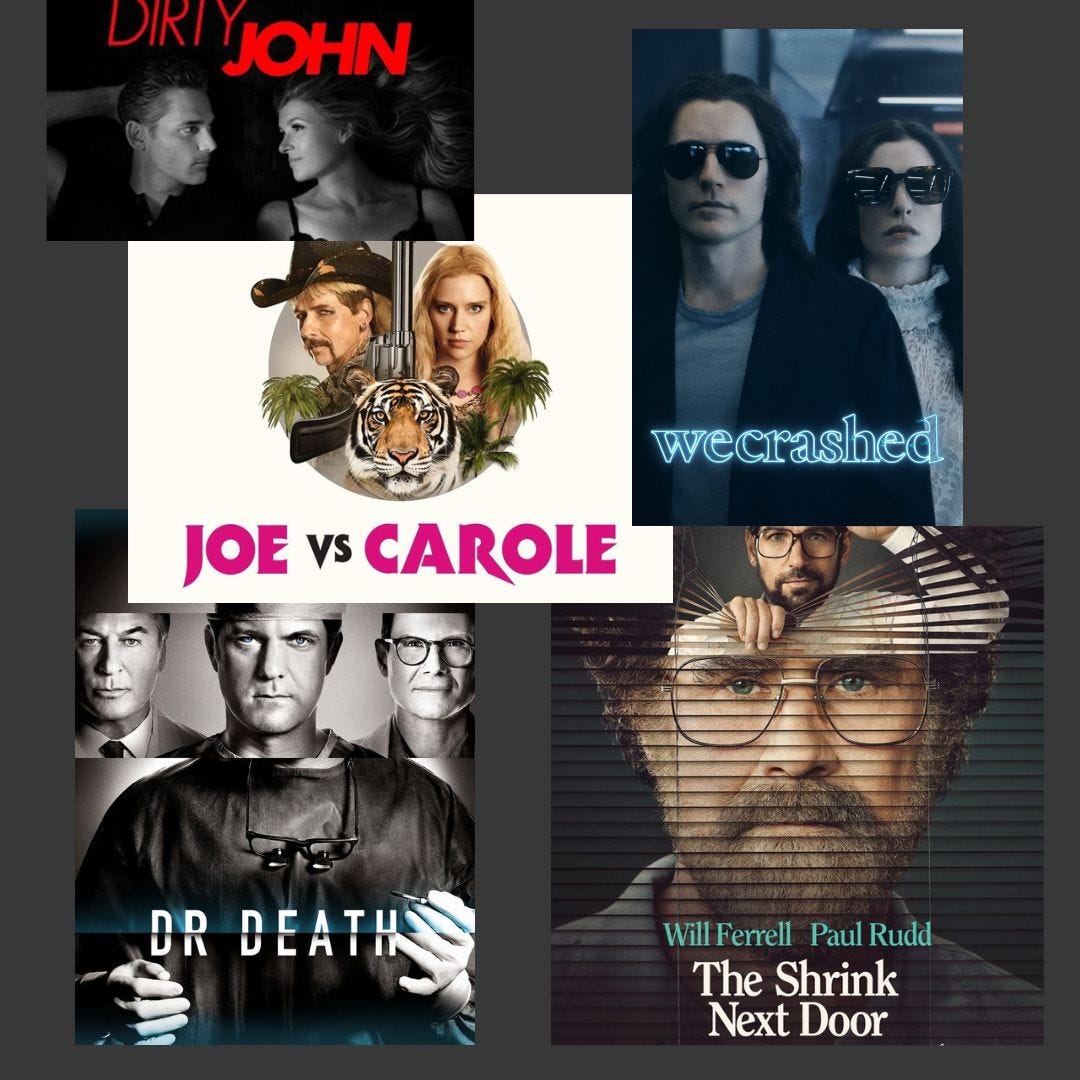
Asian A.V. Club: Do you have a plan for when someone wants to adapt Scam Factory into a tv series? Wondery has had many adaptations in the past.
Denise Chan: That’s very flattering for you to say, but I mean, who knows? Maybe that'd be really exciting if that was a possibility. When we make series for the podcast side, we really try to keep everything contained - there's so much we don't know about where this could go. All we can do is focus on making the podcast itself the best it can be. If it ends up expanding to other options? Great. Wonderful. But step one is the podcast response - hopefully it'll be really good.
Asian A.V. Club: It will be. I’ve already binged the whole series!
Denise Chan: Thank you for doing that!







